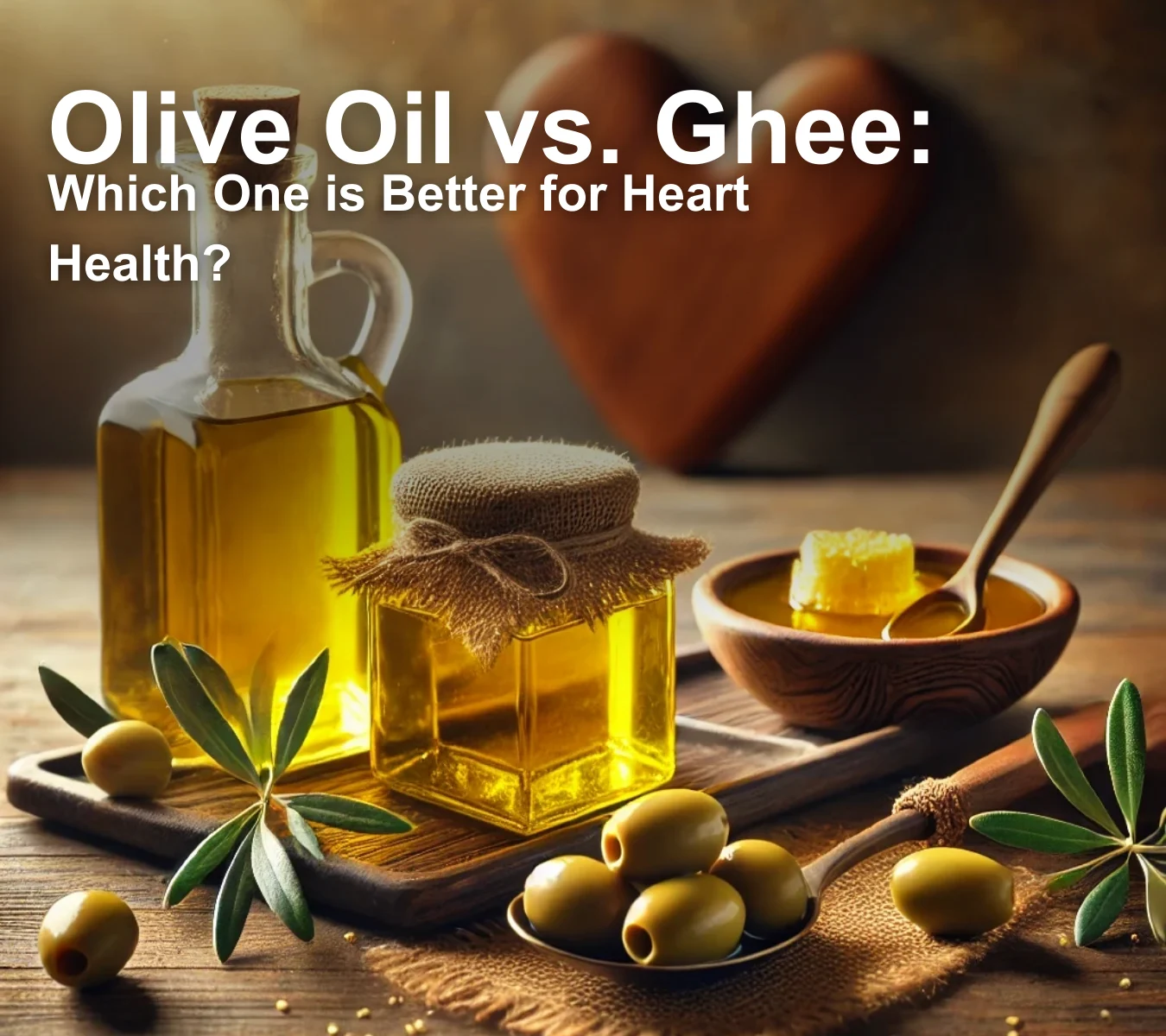1️⃣ Introduction
For centuries, both olive oil and ghee have been treasured in different cultures for their rich flavors and health benefits. Olive oil, a staple in Mediterranean diets, is praised for its heart-protective properties, while ghee, an essential part of Indian cuisine, is known for its nourishing fats. But when it comes to heart health, which one is truly better? Let’s explore their benefits, uses, and potential drawbacks to help you make the best choice for your lifestyle.
2️⃣ Health Benefits
Olive Oil: The Heart’s Best Friend
✅ Rich in Monounsaturated Fats – Olive oil is packed with monounsaturated fats (MUFAs), which help lower bad cholesterol (LDL) and increase good cholesterol (HDL), reducing the risk of heart disease.
✅ High in Antioxidants – It contains powerful antioxidants like polyphenols that reduce inflammation, protect blood vessels, and slow aging.
✅ Lowers Blood Pressure – Studies show that regular olive oil consumption can help reduce hypertension, a major risk factor for heart disease.
✅ Supports Brain Health – The anti-inflammatory properties in olive oil also protect against cognitive decline, reducing the risk of Alzheimer’s disease.
Ghee: The Traditional Elixir
✅ Boosts Good Cholesterol – Contrary to old myths, ghee can actually raise HDL (good cholesterol), supporting overall cardiovascular health when consumed in moderation.
✅ Rich in Fat-Soluble Vitamins – Ghee is loaded with vitamins A, D, E, and K, which are essential for heart, skin, and bone health.
✅ Contains Butyrate – This fatty acid has anti-inflammatory properties and promotes gut health, indirectly benefiting the heart.
✅ Stable for High-Heat Cooking – Ghee has a high smoke point, making it a healthier choice for frying and sautéing compared to many vegetable oils.
3️⃣ How to Use It Daily
Olive Oil:
✔️ Drizzle over salads, roasted vegetables, or grilled fish.
✔️ Use as a dipping sauce with whole-grain bread.
✔️ Blend into smoothies for an extra antioxidant boost.
✔️ Add to homemade dressings and marinades.
Ghee:
✔️ Use for frying or sautéing without worrying about oxidation.
✔️ Add a teaspoon to coffee for an energy boost.
✔️ Spread on toast or mix into warm dishes like dal and soups.
✔️ Apply topically for skin hydration and hair nourishment.
Best Combinations:
- Olive Oil + Lemon: Enhances digestion and detoxification.
- Ghee + Turmeric: Creates an anti-inflammatory powerhouse.
- Olive Oil + Garlic: Boosts immune function and heart health.
4️⃣ Side Effects & Precautions
Who Should Avoid Olive Oil?
🚫 Those with olive allergies should avoid it.
🚫 Excessive intake may lead to weight gain due to high-calorie content.
🚫 Some people may experience digestive discomfort with unfiltered extra virgin olive oil.
Who Should Avoid Ghee?
🚫 Individuals with lactose intolerance (though ghee has minimal lactose, it can still cause issues in some).
🚫 Those with high cholesterol levels should consume it in moderation.
🚫 Excessive consumption may lead to weight gain due to its high saturated fat content.
Safe Daily Dosage Recommendations
- Olive Oil: 1–2 tablespoons per day.
- Ghee: 1–2 teaspoons per day.
Possible Interactions with Medications
- Olive oil may enhance the effects of blood pressure-lowering medications, so consult a doctor if you are on such prescriptions.
- Ghee’s saturated fats should be monitored if taking cholesterol-lowering drugs.
Both olive oil and ghee offer remarkable health benefits, but their impact on heart health depends on individual needs. If you aim for heart protection and lower cholesterol, olive oil is your best bet. However, if you’re looking for a metabolism boost and gut health support, ghee can be a great addition in moderation.
So, which one should you choose? The answer lies in balance—incorporate both wisely into your diet for optimal benefits!
👉 Want more expert insights on healthy fats? Explore more remedies at Herbopedia.fyi!
